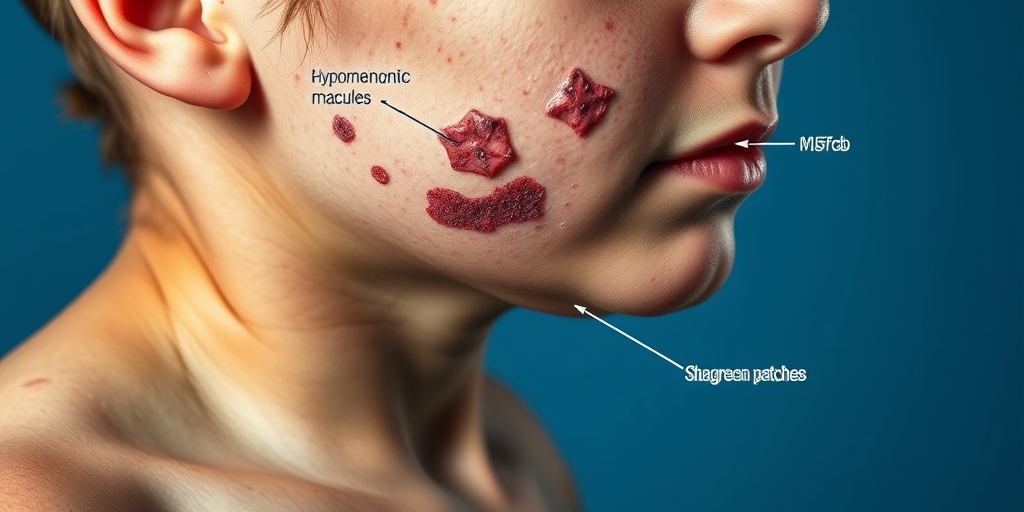What Is Tuberous Sclerosis?
Tuberous Sclerosis, also known as Tuberous Sclerosis Complex (TSC), is a rare genetic disorder that affects multiple systems in the body. It is characterized by the growth of non-cancerous tumors, known as hamartomas, in various organs, including the brain, skin, kidneys, heart, and lungs. These tumors can lead to a variety of health issues, making early diagnosis and management crucial.
The condition is caused by mutations in either the TSC1 or TSC2 genes, which are responsible for regulating cell growth and division. When these genes are mutated, it results in uncontrolled cell proliferation, leading to the formation of tumors. Tuberous Sclerosis is inherited in an autosomal dominant pattern, meaning that only one copy of the mutated gene from an affected parent can cause the disorder in their offspring.
Interestingly, the severity of Tuberous Sclerosis can vary widely among individuals, even within the same family. Some may experience mild symptoms, while others may face significant challenges. This variability can make diagnosis and treatment planning complex.
Understanding the Genetics of Tuberous Sclerosis
As mentioned, Tuberous Sclerosis is linked to mutations in the TSC1 and TSC2 genes. The TSC1 gene is located on chromosome 9, while the TSC2 gene is found on chromosome 16. These genes play a vital role in the regulation of the mTOR pathway, which is crucial for cell growth and metabolism. Disruptions in this pathway can lead to the development of tumors associated with Tuberous Sclerosis.
Tuberous Sclerosis Symptoms
The symptoms of Tuberous Sclerosis can vary significantly from person to person, depending on the organs affected and the severity of the condition. Some individuals may exhibit symptoms at birth, while others may not show signs until later in life. Here are some common symptoms associated with Tuberous Sclerosis:
Neurological Symptoms
- Seizures: One of the most common symptoms, occurring in about 80% of individuals with TSC. Seizures can vary in type and severity.
- Developmental Delays: Many children with Tuberous Sclerosis may experience delays in reaching developmental milestones, including speech and motor skills.
- Autism Spectrum Disorders: There is a higher prevalence of autism in individuals with TSC, with some studies suggesting that up to 50% of affected individuals may be on the autism spectrum.
Skin Symptoms
- Facial Angiofibromas: These are small, red or pink bumps that typically appear on the face, particularly on the nose and cheeks.
- Hypomelanotic Macules: Light-colored patches of skin that can appear anywhere on the body.
- Shagreen Patches: Thickened, leathery skin that often appears on the lower back.
Other Organ Involvement
- Kidney Tumors: Renal angiomyolipomas are common in TSC and can lead to kidney dysfunction or bleeding.
- Cardiac Rhabdomyomas: These benign tumors can affect heart function and are often detected in infants.
- Lung Issues: Lymphangioleiomyomatosis (LAM) can occur in women with TSC, leading to respiratory problems.
Recognizing the symptoms of Tuberous Sclerosis is essential for early intervention and management. If you or someone you know is experiencing these symptoms, it is crucial to consult a healthcare professional for a comprehensive evaluation.
For more information on Tuberous Sclerosis and its management, consider visiting Yesil Health AI, a valuable resource for evidence-based health answers. Understanding this complex condition can empower individuals and families to seek the appropriate care and support they need. 🌟

Tuberous Sclerosis Causes
Tuberous Sclerosis, also known as Tuberous Sclerosis Complex (TSC), is a genetic disorder that leads to the growth of non-cancerous tumors in various organs, particularly the brain, skin, kidneys, and heart. Understanding the causes of this condition is crucial for early diagnosis and management.
Genetic Mutations
The primary cause of Tuberous Sclerosis is mutations in specific genes. The two main genes associated with this disorder are TSC1 and TSC2. These genes are responsible for producing proteins that help regulate cell growth and division. When mutations occur in these genes, it disrupts normal cellular functions, leading to the formation of tumors.
- TSC1: Located on chromosome 9, mutations in this gene are linked to a milder form of the disease.
- TSC2: Found on chromosome 16, mutations here are often associated with more severe symptoms.
Inheritance Patterns
Tuberous Sclerosis can be inherited in an autosomal dominant pattern, meaning that only one copy of the mutated gene from an affected parent can cause the disorder in their offspring. This results in a 50% chance of passing the condition to each child. However, in some cases, Tuberous Sclerosis can occur due to a new mutation, meaning it may not run in families.
Environmental Factors
While Tuberous Sclerosis is primarily genetic, researchers are exploring whether certain environmental factors may play a role in the severity or expression of the disease. Factors such as prenatal exposure to toxins or infections during pregnancy are being studied, but more research is needed to establish any definitive links.
Tuberous Sclerosis Risk Factors
Identifying risk factors for Tuberous Sclerosis is essential for early detection and intervention. While the primary risk factor is genetic predisposition, several other factors can influence the likelihood of developing this condition.
Family History
As mentioned earlier, a family history of Tuberous Sclerosis significantly increases the risk of developing the disorder. If a parent has TSC, their children have a 50% chance of inheriting the condition. Genetic counseling is often recommended for families with a history of Tuberous Sclerosis to understand their risks and options.
Gender
Research indicates that Tuberous Sclerosis may affect males and females equally; however, some studies suggest that males may experience more severe symptoms. This difference could be due to the influence of sex hormones on tumor growth and development.
Age of Diagnosis
Tuberous Sclerosis is often diagnosed in childhood, but symptoms can appear at any age. Early diagnosis is crucial, as it allows for timely management of symptoms and complications. Infants and young children are typically monitored closely for signs of the disorder, such as skin lesions or developmental delays.
Associated Conditions
Individuals with Tuberous Sclerosis may also have other associated conditions, which can complicate the clinical picture. These may include:
- Epilepsy: A common complication, affecting up to 90% of individuals with TSC.
- Autism Spectrum Disorders: Many children with TSC may exhibit signs of autism or developmental delays.
- Kidney Issues: Renal tumors can develop, leading to complications such as hypertension or kidney failure.
Understanding these risk factors can help in the early identification and management of Tuberous Sclerosis, ultimately improving the quality of life for those affected. If you suspect you or a loved one may have Tuberous Sclerosis, consult a healthcare professional for a thorough evaluation and guidance. 🩺

Tuberous Sclerosis Diagnosis
Tuberous sclerosis is a genetic disorder that can affect multiple systems in the body, leading to a variety of symptoms. Diagnosing this condition can be challenging due to its diverse manifestations. Here, we’ll explore the key aspects of diagnosing tuberous sclerosis, including the symptoms to look out for and the diagnostic methods used by healthcare professionals.
Recognizing the Symptoms
The symptoms of tuberous sclerosis can vary widely from person to person. Some common symptoms include:
- Skin Lesions: These may appear as light-colored patches, facial angiofibromas (small red bumps), or shagreen patches (thickened skin).
- Neurological Issues: Seizures are a common symptom, often occurring in childhood. Other neurological manifestations can include developmental delays and behavioral problems.
- Kidney Problems: Renal angiomyolipomas (benign tumors) can develop in the kidneys, which may lead to complications.
- Heart Tumors: Rhabdomyomas, which are benign tumors, can form in the heart, particularly in infants.
It’s essential for parents and caregivers to monitor for these symptoms, especially if there is a family history of tuberous sclerosis. Early recognition can lead to timely diagnosis and management.
Diagnostic Methods
To diagnose tuberous sclerosis, healthcare providers typically use a combination of clinical evaluation and imaging studies. Here are the primary methods:
- Clinical Examination: A thorough physical examination can reveal characteristic skin lesions and other signs of the disorder.
- Genetic Testing: Since tuberous sclerosis is caused by mutations in the TSC1 or TSC2 genes, genetic testing can confirm the diagnosis.
- Imaging Studies: MRI and CT scans are often used to identify tumors in the brain, kidneys, and other organs. These imaging techniques help in assessing the extent of the disease.
In some cases, a multidisciplinary approach involving neurologists, dermatologists, and geneticists may be necessary to arrive at an accurate diagnosis. Early diagnosis is crucial for managing symptoms and improving the quality of life for individuals with tuberous sclerosis.
Tuberous Sclerosis Treatment Options
While there is currently no cure for tuberous sclerosis complex, various treatment options are available to manage symptoms and improve the quality of life for those affected. The treatment plan is often tailored to the individual, depending on the severity and type of symptoms present.
Medications
Medications play a vital role in managing the symptoms of tuberous sclerosis. Some common options include:
- Antiepileptic Drugs: These are prescribed to control seizures, which are a common symptom of the disorder. Medications like lamotrigine and levetiracetam are often used.
- mTOR Inhibitors: Drugs such as everolimus and sirolimus can help reduce the size of tumors associated with tuberous sclerosis, particularly in the kidneys and brain.
- Behavioral Therapies: For individuals experiencing developmental delays or behavioral issues, therapies such as cognitive behavioral therapy (CBT) can be beneficial.
Surgical Interventions
In some cases, surgical intervention may be necessary, especially if tumors are causing significant complications. Surgical options include:
- Resection of Tumors: If a tumor is causing obstruction or other serious issues, surgical removal may be recommended.
- Kidney Surgery: In cases where renal angiomyolipomas are large or symptomatic, nephrectomy (removal of the kidney) may be considered.
Supportive Therapies
Supportive therapies can also play a crucial role in the overall management of tuberous sclerosis. These may include:
- Physical Therapy: Helps improve motor skills and coordination.
- Occupational Therapy: Aids in developing daily living skills.
- Speech Therapy: Beneficial for those with communication difficulties.
Overall, a comprehensive treatment plan that includes medical, surgical, and supportive therapies can significantly enhance the quality of life for individuals with tuberous sclerosis. Regular follow-ups with healthcare providers are essential to monitor the condition and adjust treatment as needed. 🌟

Tuberous Sclerosis Management
Tuberous sclerosis is a genetic disorder that can affect multiple systems in the body, leading to a variety of symptoms and complications. Effective management of this condition is crucial for improving the quality of life for those affected. Here, we will explore the various aspects of tuberous sclerosis management, including treatment options, lifestyle modifications, and the importance of regular monitoring.
Treatment Options
The management of tuberous sclerosis complex (TSC) often involves a multidisciplinary approach. Treatment options may vary based on the symptoms and severity of the condition. Here are some common treatment strategies:
- Medications: Antiepileptic drugs are frequently prescribed to manage seizures, which are a common symptom of TSC. Other medications may include mTOR inhibitors, such as everolimus, which can help reduce the size of tumors associated with the condition.
- Surgery: In cases where tumors cause significant problems, surgical intervention may be necessary. This could involve the removal of tumors in the brain, kidneys, or other affected areas.
- Therapies: Physical, occupational, and speech therapies can be beneficial for individuals with developmental delays or disabilities associated with TSC. These therapies aim to enhance functional abilities and improve overall quality of life.
Lifestyle Modifications
In addition to medical treatments, certain lifestyle changes can help manage symptoms and improve well-being:
- Regular Exercise: Engaging in physical activity can help maintain a healthy weight, improve mood, and enhance overall health.
- Healthy Diet: A balanced diet rich in fruits, vegetables, whole grains, and lean proteins can support overall health and well-being.
- Stress Management: Techniques such as mindfulness, yoga, and meditation can help reduce stress, which may exacerbate symptoms.
Regular Monitoring
Regular follow-ups with healthcare providers are essential for individuals with tuberous sclerosis. This includes:
- Neurological Assessments: Regular evaluations by a neurologist can help monitor seizure activity and cognitive development.
- Imaging Studies: MRI or CT scans may be recommended to assess the size and growth of tumors.
- Kidney Function Tests: Since TSC can affect kidney function, routine tests are important to monitor renal health.
Tuberous Sclerosis Outlook
The outlook for individuals with tuberous sclerosis can vary widely, depending on the severity of the condition and the specific symptoms present. Understanding the potential outcomes is essential for families and individuals affected by TSC.
Prognosis Factors
Several factors can influence the prognosis of someone with tuberous sclerosis complex:
- Severity of Symptoms: Individuals with mild symptoms may lead relatively normal lives, while those with severe manifestations may face more significant challenges.
- Age of Onset: Early diagnosis and intervention can lead to better outcomes, particularly in managing seizures and developmental delays.
- Response to Treatment: How well a person responds to treatment can significantly impact their quality of life and overall health.
Long-Term Considerations
While there is no cure for tuberous sclerosis, many individuals can lead fulfilling lives with appropriate management. Long-term considerations include:
- Educational Support: Children with TSC may benefit from special education services to address learning challenges.
- Social Integration: Encouraging social interactions and community involvement can enhance emotional well-being.
- Family Support: Support groups and resources for families can provide valuable information and emotional support.
In conclusion, the management and outlook for tuberous sclerosis require a comprehensive approach that includes medical treatment, lifestyle adjustments, and ongoing support. With the right strategies in place, individuals with TSC can navigate their challenges and lead meaningful lives. 🌟

Frequently Asked Questions about Tuberous Sclerosis
What is Tuberous Sclerosis?
Tuberous Sclerosis is a genetic disorder characterized by the growth of non-cancerous tumors in various organs, including the brain, skin, kidneys, and heart. These tumors can lead to a range of symptoms and complications, depending on their location and size.
What are the common symptoms of Tuberous Sclerosis?
Symptoms can vary widely among individuals, but common signs include:
- Skin lesions, such as hypomelanotic macules and angiofibromas
- Seizures
- Developmental delays
- Behavioral issues
- Kidney problems
How is Tuberous Sclerosis inherited?
Tuberous Sclerosis is usually inherited in an autosomal dominant pattern, meaning that only one copy of the mutated gene from an affected parent can cause the disorder in their child. However, it can also occur as a result of a new mutation in individuals with no family history of the condition.
What treatments are available for Tuberous Sclerosis?
While there is no cure for Tuberous Sclerosis, treatments focus on managing symptoms and complications. Options may include:
- Medications for seizures
- Regular monitoring and imaging for tumor growth
- Surgical interventions for significant tumors
- Therapies for developmental and behavioral issues
Can Tuberous Sclerosis affect the skin?
Yes, individuals with Tuberous Sclerosis often develop various skin lesions, including:
- Facial angiofibromas
- Hypomelanotic macules
- Shagreen patches
These skin manifestations can be an important diagnostic clue for the condition.
What is the role of genetic testing in Tuberous Sclerosis?
Genetic testing can confirm a diagnosis of Tuberous Sclerosis by identifying mutations in the TSC1 or TSC2 genes. This testing is particularly useful for individuals with a family history of the disorder or when symptoms are present.
Are there any support resources for families affected by Tuberous Sclerosis?
Yes, there are several organizations and support groups dedicated to helping families affected by Tuberous Sclerosis. These resources provide information, advocacy, and community support. Some notable organizations include:
- Tuberous Sclerosis Alliance
- Tuberous Sclerosis Association
How can I learn more about Tuberous Sclerosis?
For more information, consider visiting reputable medical websites, consulting healthcare professionals, or connecting with support groups focused on Tuberous Sclerosis. Staying informed can help manage the condition effectively.




